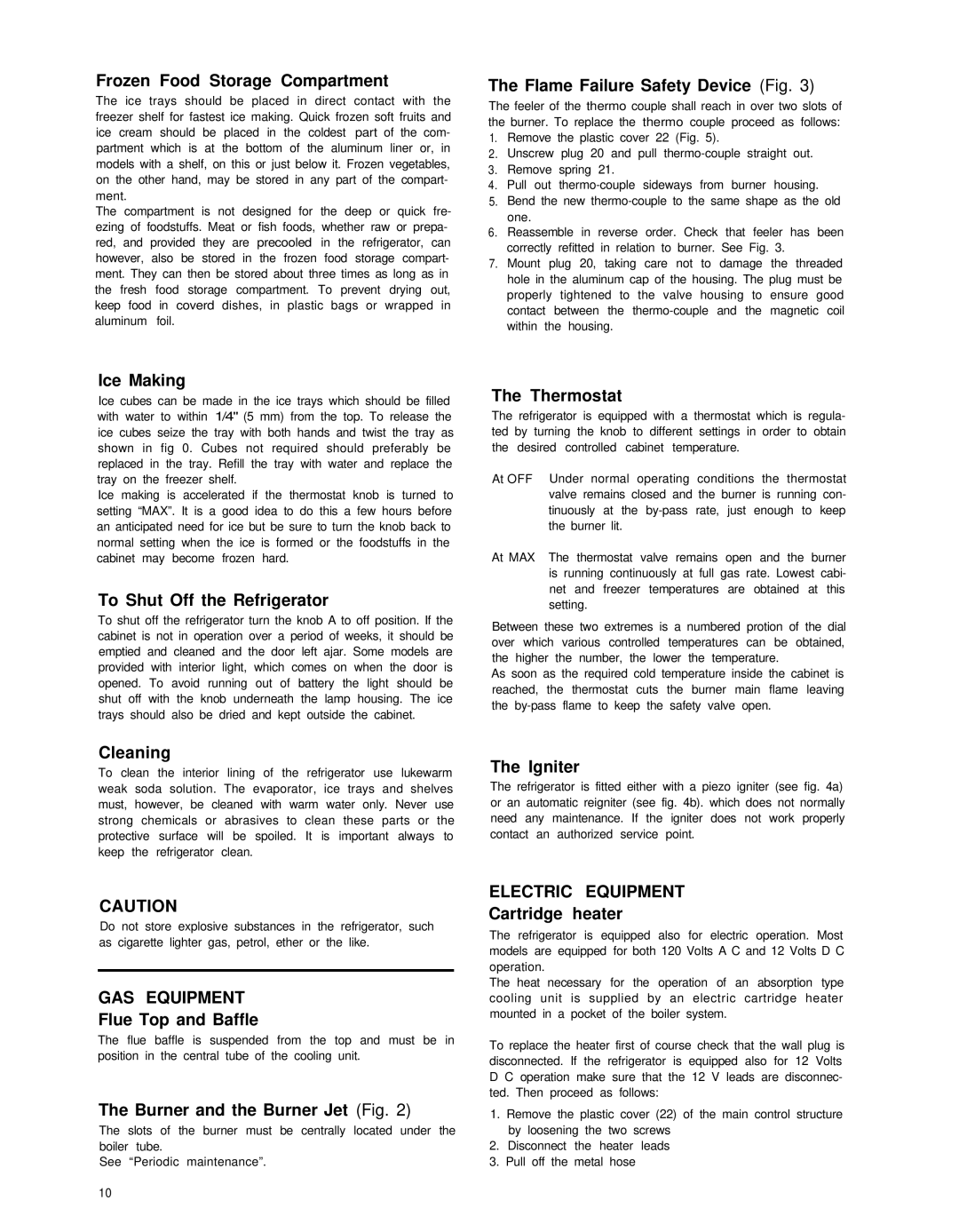Frozen Food Storage Compartment
The ice trays should be placed in direct contact with the freezer shelf for fastest ice making. Quick frozen soft fruits and ice cream should be placed in the coldest part of the com- partment which is at the bottom of the aluminum liner or, in models with a shelf, on this or just below it. Frozen vegetables, on the other hand, may be stored in any part of the compart- ment.
The compartment is not designed for the deep or quick fre- ezing of foodstuffs. Meat or fish foods, whether raw or prepa- red, and provided they are precooled in the refrigerator, can however, also be stored in the frozen food storage compart- ment. They can then be stored about three times as long as in the fresh food storage compartment. To prevent drying out, keep food in coverd dishes, in plastic bags or wrapped in aluminum foil.
The Flame Failure Safety Device (Fig. 3)
The feeler of the thermo couple shall reach in over two slots of the burner. To replace the thermo couple proceed as follows:
1.Remove the plastic cover 22 (Fig. 5).
2.Unscrew plug 20 and pull
3.Remove spring 21.
4.Pull out
5.Bend the new
6.Reassemble in reverse order. Check that feeler has been correctly refitted in relation to burner. See Fig. 3.
7.Mount plug 20, taking care not to damage the threaded hole in the aluminum cap of the housing. The plug must be properly tightened to the valve housing to ensure good contact between the
Ice Making
Ice cubes can be made in the ice trays which should be filled with water to within 1/4" (5 mm) from the top. To release the ice cubes seize the tray with both hands and twist the tray as shown in fig 0. Cubes not required should preferably be replaced in the tray. Refill the tray with water and replace the tray on the freezer shelf.
Ice making is accelerated if the thermostat knob is turned to setting “MAX”. It is a good idea to do this a few hours before an anticipated need for ice but be sure to turn the knob back to normal setting when the ice is formed or the foodstuffs in the cabinet may become frozen hard.
To Shut Off the Refrigerator
To shut off the refrigerator turn the knob A to off position. If the cabinet is not in operation over a period of weeks, it should be emptied and cleaned and the door left ajar. Some models are provided with interior light, which comes on when the door is opened. To avoid running out of battery the light should be shut off with the knob underneath the lamp housing. The ice trays should also be dried and kept outside the cabinet.
The Thermostat
The refrigerator is equipped with a thermostat which is regula- ted by turning the knob to different settings in order to obtain the desired controlled cabinet temperature.
At OFF | Under normal operating conditions the thermostat | |||
| valve remains closed and the burner is running con- | |||
| tinuously at the | just | enough to keep | |
| the | burner lit. |
|
|
At MAX | The | thermostat valve remains | open | and the burner |
| is running continuously at full | gas rate. Lowest cabi- | ||
net and freezer temperatures are obtained at this setting.
Between these two extremes is a numbered protion of the dial over which various controlled temperatures can be obtained, the higher the number, the lower the temperature.
As soon as the required cold temperature inside the cabinet is reached, the thermostat cuts the burner main flame leaving the
Cleaning
To clean the interior lining of the refrigerator use lukewarm weak soda solution. The evaporator, ice trays and shelves must, however, be cleaned with warm water only. Never use strong chemicals or abrasives to clean these parts or the protective surface will be spoiled. It is important always to keep the refrigerator clean.
The Igniter
The refrigerator is fitted either with a piezo igniter (see fig. 4a) or an automatic reigniter (see fig. 4b). which does not normally need any maintenance. If the igniter does not work properly contact an authorized service point.
CAUTION
Do not store explosive substances in the refrigerator, such as cigarette lighter gas, petrol, ether or the like.
GAS EQUIPMENT
Flue Top and Baffle
The flue baffle is suspended from the top and must be in position in the central tube of the cooling unit.
The Burner and the Burner Jet (Fig. 2)
The slots of the burner must be centrally located under the boiler tube.
See “Periodic maintenance”.
ELECTRIC EQUIPMENT
Cartridge heater
The refrigerator is equipped also for electric operation. Most models are equipped for both 120 Volts A C and 12 Volts D C operation.
The heat necessary for the operation of an absorption type cooling unit is supplied by an electric cartridge heater mounted in a pocket of the boiler system.
To replace the heater first of course check that the wall plug is disconnected. If the refrigerator is equipped also for 12 Volts D C operation make sure that the 12 V leads are disconnec- ted. Then proceed as follows:
1.Remove the plastic cover (22) of the main control structure by loosening the two screws
2.Disconnect the heater leads
3.Pull off the metal hose
10
